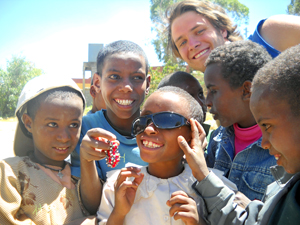Todd Coady wanted more out of college than a degree or two. He wanted to make a difference and maybe change a few lives. He ended up changing 96 of them.
After three years at Eckerd College in St. Petersburg, Fla, where he earned a bachelor’s degree in mathematics, Coady came to Washington University in St. Louis in pursuit of an engineering degree as a participant in the School of Engineering & Applied Science’s dual-degree program. He is a candidate for a bachelor of science degree in mechanical engineering May 18.
A week after arriving at WUSTL, the Jarrettsville, Md., native found himself at a meeting of the campus chapter of Engineers Without Borders, which was looking for an international service project to get behind.
Coady related to the group his earlier experiences with the Mekelle Blind School, located in the southern tip of the Saharan Desert in Ethiopia, which was in dire need of water for drinking and agriculture, a common problem in that part of the world. Coady’s passion for the school’s students made it the overwhelming choice.
“It just took off from there,” says Coady, an inveterate outdoorsman who loves to hike, mountain climb and surf, among other challenges. “I had been in engineering classes maybe a week, so I came not as an engineer but as a guy who had seen 96 faces that I just couldn’t forget.”
Following nine months of research, paper work and conference calls, Engineers Without Borders certified the project, and the WUSTL chapter made a five-year commitment to the school. For Coady, it was the start of keeping a promise he had made when he first visited Ethiopia.
“I told the kids I was going to come back as an engineer and we were going to fix the place up and solve some of the really big problems they were having,” he says.

Coady and four other WUSTL students went to Ethiopia for the first time last May for an initial assessment of the school and its surrounding community. What they found was frightening. The school didn’t have the capacity to last for more than a couple of days without water from the city’s system, which sometimes shuts down for a week at a time during the region’s dry season.
Although the school had a functioning water tower with two 5,000-liter tanks, it was sagging and in desperate need of repair. So when the group returns later this month, they will be fixing the tower and then installing a new pump for an existing well.
“We’ll be connecting the well to these tanks so the school will be entirely self-sufficient from the city water system,” Coady says. “Then we’ll be connecting the tanks to the far side of the campus where they can use the water for agriculture.”
Ironically, when the group returns to Ethiopia, the newly graduated Coady will not be with them.
“It’s hard for me to leave a project that I care so much about, but to know that it’s in good hands and the future is bright is a great thing,” he says.
Melanie Osborn, assistant dean of engineering student services, helped Coady shepherd the project through the rigors of the approval process with Engineers Without Borders, and she saw first-hand what makes him tick.
“Todd is an excellent leader and his passion is contagious,” she says. “From the onset, Todd knew that he would be passing this project on, and I have watched him groom current members to take his place and allow this project to live far beyond his time at WUSTL.”
Coady is still discerning his next career steps, but whatever he does he knows there will always be 96 Ethiopian faces urging him on.
“Every time I catch myself starting to slack or complain about time, I just think back to my time at the school,” he says. “The kids cherish school because it’s their only chance. If they don’t pass their national exams in eighth grade, they don’t move forward with their education, and then they are going to beg on the streets. So I need to do everything I can to help them. There’s no letting go.”